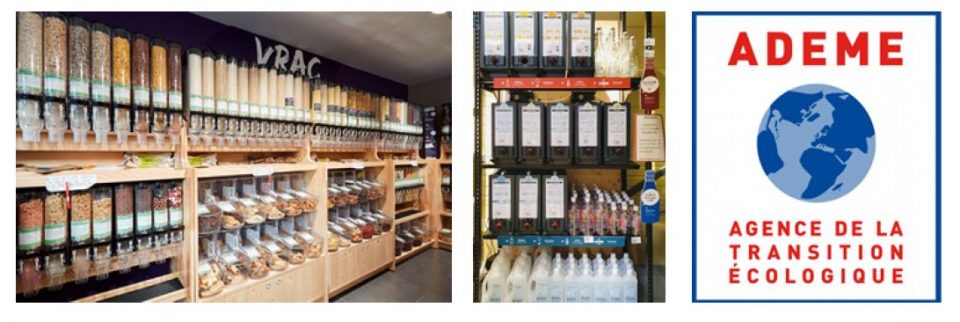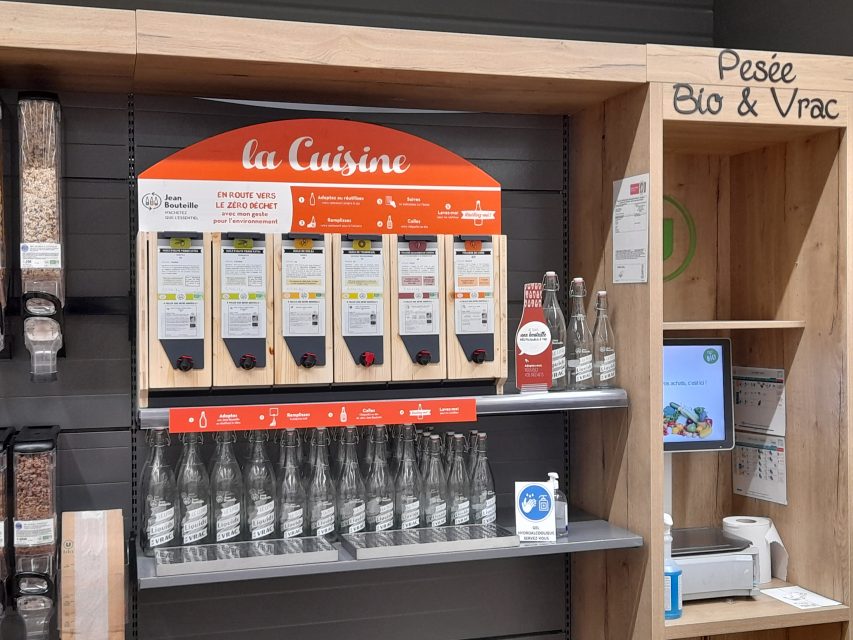
L’appel à projets Tous au Vrac édition 2021 est lancé !
- Le marché du vrac
L’ADEME a dévoilé fin 2021, les résultats de ses études sur les pratiques de la vente en vrac versus en préemballé. 3 volets ont été présentés afin de mesurer l’impact du vrac à la fois environnemental, sanitaire & économique. Les résultats et perspectives sont positifs pour le développement de la filière. On vous aide à y voir plus clair !

L’ACV (Analyse du Cycle de Vie) présente 10 scénarios fictifs avec à la fois du vrac sec et liquide pour couvrir les différents types de produits et de solutions de distribution. Globalement, les résultats de la vente en vrac sont positifs, dès lors que les distributeurs et les consommateurs adoptent de bonnes pratiques, ce qui semble logique et constitue déjà les enjeux sur lesquels travaille la filière !
L’ADEME estime qu’en moyenne la vente en vrac « devrait permettre de réduire la masse de déchets d’emballage d’au moins deux tiers, sur toute la chaîne de distribution ».
Les bonnes pratiques incluent notamment d’éviter les pertes de produits à tout niveau, de réduire les emballages en amont lors de la logistique, d’opter pour des conditionnements les plus légers possibles, de choisir une solution de distribution moins impactante, ergonomique et durable, de réduire la taille des boucles de réemploi, de réemployer suffisamment le contenant.. etc

Résultats :
La distribution vrac est encore plus pertinente pour les produits lourdement emballés, c’est le cas des bouteilles en verre. Pour le conditionnement en bag in box et service gravitaire (choisis chez Jean Bouteille), les résultats sont très positifs (cf graphiques ci-dessus) :
Facteurs d’influence :
Le choix des meubles de distribution a un impact considérable sur les résultats au global notamment concernant le lavage (attention au système de pompage trop compliqué, avec cuve et tuyauterie) et l’électronique (remise en question du surplus potentiel de technologie de certains systèmes).
Il est recommandé de se tourner vers des solutions gravitaires en favorisant leur durée de vie et en optimisant leur masse par rapport au produit. Le mieux est de réaliser une ACV spécifique pour chaque modèle développé, afin de vérifier son impact sur toute la chaîne de valeur.

Le guide révèle les mêmes types de risques que sur les autres réseaux de distribution mais certains plus élevés pour le vrac comme la protection du produit et la traçabilité. Néanmoins, le Guide des Bonnes Pratiques du Réseau Vrac , fourni aux adhérents de l’association qui suivent la formation dédiée, est déjà existant sur le sujet pour répondre à ces enjeux. Il y est notamment recommandé de veiller à :
• L’entretien fréquent et enregistré des équipements de vente (si possible à chaque changement de lot) ;
• Un étiquetage qui va au-delà des seules mentions obligatoires comme notamment le numéro de lot ou la date de consommation ;
• L’affichage des allergènes présents dans l’ensemble du rayon ;
• Ou encore l’obligation pour les distributeurs de suivre une formation HACCP spécifique à la vente en vrac de produits alimentaires et de non alimentaires.
L’ADEME a travaillé avec L’Institut National de la Consommation (INC) pour comparer les prix. Les relevés de prix ont concerné 3 types de magasins : des hypermarchés et supermarchés, des magasins spécialisés bio (MSB) et des magasins spécialisés vrac (MSV). 8 produits emblématiques de la vente en vrac ont été étudiés : les amandes, les lentilles, le sucre, le riz, l’huile d’olive, le vinaigre, la lessive et le savon liquide.
L’enquête révèle d’abord que les consommateurs optant pour le vrac font notamment ce choix par souci d’économie. Cette pratique permet d’acheter la quantité souhaitée et donc de maîtriser son budget. A noter aussi que plusieurs facteurs expliquent les variations de prix et sont à prendre en compte : le lieu de production, la qualité du produit, la quantité d’emballages, et la main d’œuvre nécessaire pour gérer le rayon. De plus, il faut avant tout comparer ce qui est comparable et les produits vrac sont souvent plus engagés que ceux conventionnels.
4 informations clés à retenir suite à ces relevés prix :
● Les produits conventionnels sont plus chers en vrac.
● Les produits bio sont surreprésentés dans le vrac pour des raisons à la fois historiques ( le vrac étant d’abord arrivé via les magasins bio ) et environnementales (engagement global des marques bio).
● Les produits bio sont moins chers en vrac (écarts allant de -4 à -22%)
● Le vrac est moins cher en magasin bio qu’en grandes surfaces et épiceries vrac
Télécharger les études complètes




